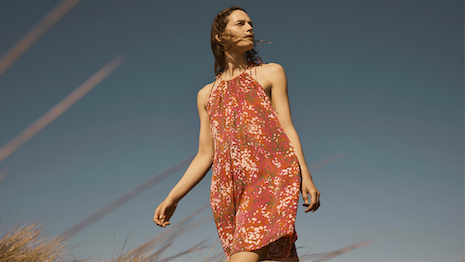- About
- Subscribe Now
- New York,
July 8, 2019

 Consumers are gravitating towards minimalism and convenience. Image courtesy of Net-A-Porter
Consumers are gravitating towards minimalism and convenience. Image courtesy of Net-A-Porter
More consumers are making fewer purchases, as interest in sustainability and minimalism continues to grow among shoppers.
Nearly three-quarters of United States consumers ages 18 to 35 report buying less, compared to 66 percent of consumers of all ages, according to the “Future of Retail 2019” report from Walker Sands Communications. Additionally, almost half of consumers are now open to making big-ticket purchases online as acceptance of ecommerce shopping grows.
“Consumer buying habits are at a paradox between convenience and connection,” said Erin Jordan, vice president/partner at Walker Sands and author of the report. “While in recent years research pointed to an influx of convenience-driven commerce, we're starting to see consumers, especially younger consumers, put more weight on purchases they're making and who they're buying from.
“We believe the paradox between convenience and connection is a spectrum where brands can have success weighting these two differently depending on their product category and brand,” she said. “While many categories can see opportunities with increased focus on convenience, luxury is an example of a category that will continue to see growth through its connection with consumers.”
The Walker Sands’ “Future of Retail 2019” study was based on a survey of 1,600 U.S. consumers.
Consumer changes
As consumers purchase fewer items in favor of investing in experiences, they are also motivated by minimalism.
Two-thirds of shoppers report buying less in an effort to maintain a clean, organized lifestyle. This trend is driven by younger consumers, with 72 percent of respondents ages 18 to 35 having “less is more” mindsets towards material possessions.
As a result of this mentality, consumers are also more willing to rent goods.
Rent the Runway has found success with high-end apparel rentals. Image credit: Rent the Runway
In the past year, 49 percent of all consumers have rented at least one type of product, including 65 percent of consumers between 18 and 35 years old.
At 28 percent, books are the top rental category among consumers, followed by cars and clothing at 17 percent. Fifteen percent of respondents have also rented furniture or other household goods.
The growing acceptance of rentals is also impacting the luxury space.
Recently, ecommerce platform Rent the Runway linked with department store chain Nordstrom to make apparel rentals more convenient for customers (see story).
With consumers limiting their purchases, they are also interested in flexible options that allow them to try items before committing to purchasing.
Although less than 10 percent of consumers currently use “try-and-buy” services such as Stitch Fix or Trunk Club, 31 percent of respondents expressed interest in trying these services within the next year.
Net-A-Porter is among those updating its “try-before-you-buy” service, featuring curated at-home shopping consultations for their most loyal customers, reflecting the growing emphasis on convenience and service.
“Style Trial” is a new service that expands on the Richemont-owned retailers’ currents offerings for their “Extremely Important People,” or EIPs. EIP have a seven-day period to try up to 30 different pieces of apparel before purchasing. Items can be chosen by consumers themselves, or by their designated personal shopper (see story).
Along with the flexibility and convenience of ecommerce, consumers are also becoming more accustomed to making more valuable purchases online.
Researching for big-ticket products is becoming easier online, and Walker Sands cites findings from Retail Dive that 87 percent of consumers now begin product searches digitally.
Large, high-priced items are the categories seeing the most growth in online shopping, particularly among older consumers. Sixty-one percent of shoppers older than 61 are likely to purchase expensive items online, compared to 51 percent of consumers ages 18 to 25.
Luxury shoppers are becoming more comfortable with ecommerce. Image credit: 1stdibs
In the past year, 34 percent of respondents browsed for cars online and 13 percent have purchased a car online, while a third also searched online for furniture with 20 percent completing online purchases.
Luxury fashion is another category growing in ecommerce, with 21 percent of consumers searching high-end apparel online and 11 percent buying luxury fashion goods online.
Luxury retail adapts
Sustainability remains another consideration among younger consumers, with 65 percent of those between 18 and 35 at least somewhat more likely to purchase from a brand or retailer committed to environmentally ethical practices.
High-end retailers are working to adapt to this emerging consumer mindset, including major ecommerce players.
For instance, online retailer Net-A-Porter is hoping to help shoppers indulge in sustainable fashion with the launch of a platform dedicated to environmentally conscious apparel and accessories.
Affluent consumers are becoming more interested in ethical and environmentally responsible fashion, but it can be challenging to know which brands are truly committed to sustainability. With the launch of Net Sustain, the retailer has designated 26 brands and more than 500 products that meet at least one of Net-A-Porter's sustainability criteria (see story).
Similarly, British department store chain Selfridges is planning to completely eliminate the sale of exotic skins by February 2020.
The retailer is currently phasing out materials such as crocodile, alligator, lizard and python, and plans to only sell agricultural leather in the future. This is part of Selfridges’ broader sustainability push, as it seeks to offer eco-friendly products that align with consumers’ ethical values (see story).
“Our research reveals Millennials are more focused on sustainability, which may speak to their declining interest in quantity over quality,” Walker Sand’s Ms. Jordan said. “The ‘Marie Kondo Effect’ has also played a role – her books and series came out at a time when consumers of all ages were feeling overwhelmed with stuff and technology, and its sudden rise to popularity is indicative of consumers who were already craving a more clean, organized lifestyle.”
Share your thoughts. Click here